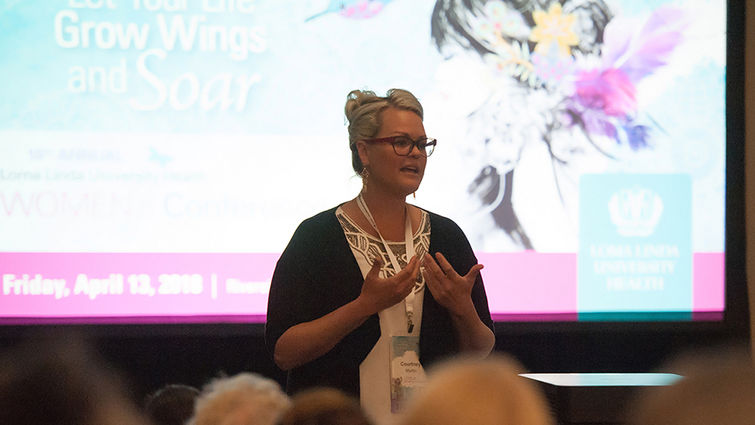
Face your fears, talk them out and make a plan, recommends Courtney Martin, DO.
The bad news first: women at every stage of life are vulnerable to anxiety and depression, and in no small part due to expectations placed upon them by culture, family and double standards.
Be a good girl.
Put your family before yourself.
Do everything right, and nothing bad will happen to you.
Smile.
Always look pretty.
Please your man.
The good news: OB-GYN Courtney Martin, DO, understands — and offers some strategies for dealing with the pressures of living in a world that doesn’t feel so livable.
She dialogued with women of every age who attended a session she held about mental health during the Loma Linda University Health 2018 Women’s Conference.
“You’re not crazy,” Martin assured one woman in the audience. “You just need to develop coping skills and a plan.”
Facing distressful triggers
A coping strategy many women employ is shutting down their emotions to avoid feeling pain. But it is not possible to selectively block distress; the ability to feel happiness gets suppressed, too, Martin said.
“You’re guarding your heart, but it’s the wrong coping skill for when something bad happens to you,” she said.
The healthier path is to confront the distressing triggers. Martin recommends a journaling technique for coping with life’s worries.
- Search out what triggers your fears.
- Write the triggers down.
- In a second column, write factors that may make a feared outcome unlikely.
- Develop a plan for dealing with feared situations if they were to come true.
Life’s “what-ifs” can be particularly hard for women to deal with, she said.
“Writing down the thing that scares you most and working through it can help empower you,” Martin said.
But reaching true empowerment doesn’t stop with self-dialogue.
Relief through speaking up to others
Becoming further vulnerable to discuss your stressors with others is also important for healthfully coping with pressures and pain. It helps for women to stick together, Martin said.
“We’re all traversing together,” she said. “Build each other up and be kind.”
Going a step further is something Martin also recommends by speaking with a counselor or psychiatrist.
“We all need time to be able to have a straightforward and honest conversation with someone who isn’t a friend or family member,” she said. “Having a person bound by patient confidentiality is fantastic for your health!”
Also fantastic for one’s health and not to be forgotten are the basics: eating well, exercise, and taking time for oneself (even moms!). Self-care is important at every stage of life, but Martin also mentioned that good lifestyle habits are important for aging healthfully.
At the end of the day, though, women have limits, and that is OK. Knowing your limits — and communicating them to others — helps remove some of life’s burdens, Martin said.
